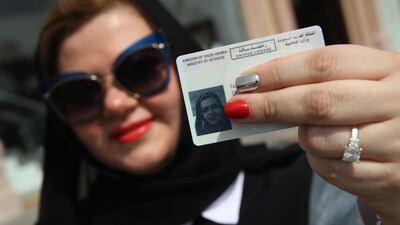Allowing Saudi women to drive could help the kingdom reap as much income as selling shares in Saudi Aramco.
The move, which went into effect on Sunday, could add as much as $90 billion to economic output by 2030, with the benefits extending beyond that date, according to Bloomberg Economics. Selling as much as 5 per cent stake in Saudi Arabian Oil Co. - at the most optimistic valuation - could generate about $100 billion.
Saudi Arabia ended its status as the last country on earth to prohibit women from taking to the wheel.

“Lifting the ban on driving is likely to increase the number of women seeking jobs, boosting the size of the workforce and lifting overall incomes and output,” according to Ziad Daoud, Dubai-based chief Middle East economist for Bloomberg Economics.
“But it’ll take time before these gains are realized as the economy adapts to absorbing a growing number of women seeking work.”
Ending the ban is one of the most socially-consequential reforms implemented by Saudi Arabia’s Crown Prince Mohammed bin Salman. It’s also a key part of his plan to veer the economy from its reliance on oil.
______________
Saudi Arabia drivers ban:
Saudi Arabia lifts ban on women drivers - live updates
Road to reform: How Saudi Arabia lifted the ban on women drivers
Lifting of Saudi driving ban will be felt across GCC borders
______________
Ziad Daoud, Bloomberg Economics, said, “The participation of women in Saudi Arabia’s labour market is poor. With only 20 per cent of females in Saudi Arabia economically active, the country even lags behind its neighbours in the Gulf, where participation averaged 42 per cent in 2016. Recognizing this, the Saudi administration made raising the female participation rate one of its main targets in the National Vision 2030 program, designed to modernize Saudi society.”
Adding 1 percentage point to the Saudi participation rate every year might add about 70,000 more women a year to the labour market, according to Daoud. The larger participation of women will lift potential economic growth by as much as 0.9 percentage points a year, “depending on the proportion that chooses to work full or part-time,” he said.
Saudi Energy Minister Khalid Al-Falih said ending the ban means “women will be more empowered and more mobile and I think they will participate more in the job market over time, so I think it’s going to contribute to the employment of females in Saudi Arabia.
“A secondary effect will probably be higher gasoline demand,” Al-Falih said in Vienna, where he was attending an OPEC meeting.

